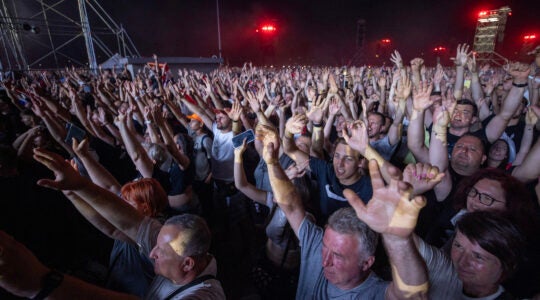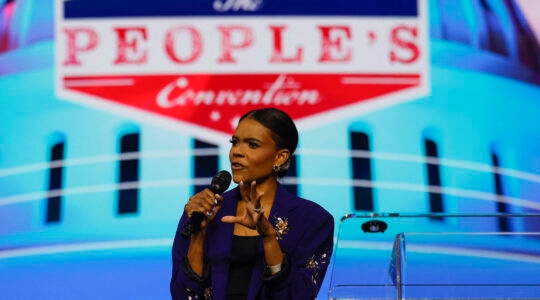Conservatives have, since the 1960s, had a heyday denouncing liberal "relativism," imagining a liberal tendency to make allowances for group of people you wouldn’t make for another, because of liberal guilt, an overweening dedication to multiculturalism, etc.
It’s an oversimplification so overwrought as to be almost meaningless, as political camp cliches on both sides often are. I see lots of absolutism among liberals, I see plenty of relativism among conservatives, but, as the gods of coincidence-blogging would have it, this week two of the most influential "liberal" columnists dip into relativist waters having to do with Israel. And come out with strikingly different results.
First, let me explain why I put "liberal" in quotes. In both columnists’ cases, there’s a big question, at the very least, about whether it applies.
Maureen Dowd of the New York Times writes breezily, she writes a lot about sex, and she has adopted some pronouncedly liberal positions — favoring gay marriage and Barack Obama most recently — but in the past, dig beyond the chatty Hollywood Wives tone, and their lurks a strict Catholic upbringing, one that played a major role in making the Clintons pariahs in some influential 1990s Washington circles.
Richard Cohen at the Washington Post probably has the more consistent liberal portfolio in terms of his endorsements, but has also been a creature of Washington’s parochial and conservative conventional wisdoms; in one of the signal lib/con litmus tests of the Aughts, he strongly favored the Iraq war (although he came to regret that.)
So to their columns this week.
Dowd is in Riyadh, and she starts off bemused — she even says its "wild" — that Prince Saud al-Faisal, the Saudi foreign minister, is denouncing Israeli religious extremism:
“We are breaking away from the shackles of the past,” the prince said, sitting in his sprawling, glinting ranch house with its stable of Arabian horses and one oversized white bunny. “We are moving in the direction of a liberal society. What is happening in Israel is the opposite; you are moving into a more religiously oriented culture and into a more religiously determined politics and to a very extreme sense of nationhood,” which was coming “to a boiling point.”
“The religious institutions in Israel are stymieing every effort at peace,” said the prince, wearing a black-and-gold robe and tinted glasses.
I first heard this Saudi take a couple of years ago, at a press conference the Saudi ambassador to Washington gave on the sidelines of the Annapolis conference toward the end of 2007: States based on stringent ethnic and religious identifiers were on the way out, the ambassador insisted. What made this such a hoot — beyond the obvious point of it being expressed by the envoy of a country with a self-definition narrowed not just to faith, or tribe but to a single extended family — was that the Saudis tried to keep Israeli reporters out of the press conference. Yay openness.
But hey, Saud’s a groovy guy — he wears tinted glasses — so maybe, Dowd thinks, he has a point. Israel does seem to be moving one way, she suggests, while the Saudis are moving another:
Israel is a secular society that some say is growing less secular with religious militants and the chief rabbinate that would like to impose a harsh and exclusive interpretation of Judaism upon the entire society. Ultra-Orthodox rabbis are fighting off the Jewish women who want to conduct their own prayer services at the Western Wall. (In Orthodox synagogues, some men still say a morning prayer thanking God for not making them women.)
The word progressive, of course, is highly relative when it comes to Saudi Arabia. (Wahhabism, anyone?) But after spending 10 days here, I can confirm that, at their own galactically glacial pace, they are chipping away at gender apartheid and cultural repression.
Where to start. Orthodox hegemony in some areas has always been an issue in Israel — but I really don’t know who Dowd’s weaselly "some" are who say it is growing "less secular." Her own paper just featured, in its weekend travel section, a guide to Israeli eateries serving delicious pork creations, a byproduct of the recent massive aliyot from the pronouncedly secular former Soviet Union.
And even among the Orthodox: It’s true, the same, decades-old effort to make their faith more pervasive persists — but there are also signs of liberalism from within. This is what happens when a religious minority lives among a secular majority: The smaller group’s values are more likely to be bent and shaped by the larger group. See under: Srugim.
A few years ago, the Israeli embassy asked local Hebrew-speaking journalists — as it routinely does — to meet with a visiting minister, in this case, Eli Yishai, the Shas Party leader and at that time the minister of trade and labor. Only two of us showed up — I and Shmuel Rosner, then of Ha’aretz. Shmuel tried to extract some statecraft from Yishai — not an easy task, because matters of foreign and defense policy seem to bore Yishai, which is probably why only Shmuel and I bothered to attend the meeting.
I asked Yishai what else he had done while in the United States, and he said he had fund raised for vocational training for fervently Orthodox women. I pressed him on this — Shmuel, bemused, thought I was humoring Yishai, but I wasn’t — and Yishai’s eyes lit up, as he explained how it had become necessary to bring his community’s women out of household confines, to make them part of the workforce.
So Yishai was using his government portfolio to empower women and Saud is using his government portfolio to … flirt with Dowd. (He tells her to bring an international driver’s license next time she’s in Saudi, maybe she can set a precedent, hahaha. Ugh.)
Not that this is the whole picture. The women at the Kotel, the back of the bus issue, the cutting off not just of the Conservative and Reform streams, but of Modern Orthodoxy. These are all vexing issues Israel and Israel’s Orthodox need to confront. But to suggest the nation — and even its Orthodox — are sliding into theocracy is just nutty.
Cohen takes on another relativism, the comparing of Israeli practices in the West Bank to apartheid — and dispatches it cleanly, and with vigor:
The Israel of today and the South Africa of yesterday have almost nothing in common. In South Africa, the minority white population harshly ruled the majority black population. Nonwhites were denied civil rights, and in 1958, they were even deprived of citizenship. In contrast, Israeli Arabs, about one-fifth of the country, have the same civil and political rights as do Israeli Jews. Arabs sit in the Knesset and serve in the military, although most are exempt from the draft. Whatever this is — and it looks suspiciously like a liberal democracy — it cannot be apartheid.
The West Bank, more or less under Israeli military rule, is a different matter. But it is not part of Israel proper, and under every conceivable peace plan — including those proposed by Israeli governments — almost all of it will revert to the Palestinian Authority and become the heartland of a Palestinian state.
I have a minor quibble or two with Cohen; he starts off with Jimmy Carter’s apology to the Jews, made through JTA, but scores Carter for not specifying that he should apologize for getting the "Israel=Apartheid" rolling with his bestseller. Carter did make that specification in my interview with him after he released the letter; and he made it clear that, while he regrets using the term, he meant that apartheid was a threat should Israel absorb the West Bank — not that it was currently practiced.
Cohen insists that the term is now being abused, during "Israel Apartheid Week" — and that its proponents are, indeed, relativists, in the worst sense:
Yet Israel’s critics continue to hurl the apartheid epithet at the state when they have to know, or they ought to know, that it is a calumny. Interestingly, they do not use it for Saudi Arabia, which maintains as perfect a system of gender apartheid as can be imagined — women can’t even drive, never mind vote — or elsewhere in the Arab world, where Palestinians sometimes have fewer rights than they do in Israel.
JTA has documented Jewish history in real-time for over a century. Keep our journalism strong by joining us in supporting independent, award-winning reporting.




